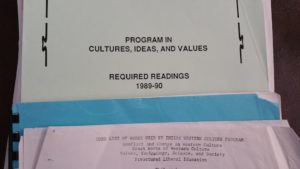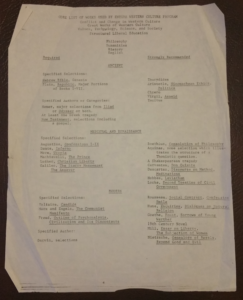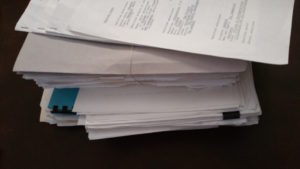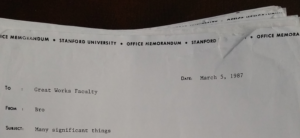‘Tis the season for wise men and wise women bearing marvelous gifts.
Recently, I received such a gift from such a person: a couple of reams of archival materials spanning about seven years of curricular change at Stanford, from the mid 1980s to the early 1990s.
The first installment of this serendipitous archive came to me in 2015, when I was still working on my dissertation. The most recent installment came earlier this month, when my generous friend discovered another stash of materials in the back of a filing cabinet.
These were the teaching files and curricular committee meeting files of an instructor in the Western Culture program. Through a friend of a friend, s/he had heard that I was working on the “canon wars” at Stanford, and s/he generously offered to send me whatever s/he had still kept from those years.
That “whatever” turned out to be quite a lot: syllabi, minutes from meetings, midterm and final exam questions, memos from and to various administrators and program directors, working lists of readings that were added and changed from year to year, lists of professors teaching in the various tracks, schedules of lectures and lists of potential and confirmed lecturers, a grading rubric for evaluating student writing, course readers, and on and on and on. There are a few memos from William “Bro” Adams, then a track leader in the Western Culture program, now the head of the NEH.
Tucked away in the midst of all these materials are bits of flotsam and jetsam from life at Stanford in the late 1980s.
There’s a photocopy of a 100-question “Purity Test” that circulated regularly among the undergraduates on campus during those years. (Ask me no questions and I’ll tell you no lies.)
There’s a grocery list written on the back of a mimeographed memo:
Fish
Shampoo
Baking Soda
Juice
Milk
Beer
Indeed, one of the most interesting things about this accidental archive is the juxtaposition of mimeographed, type-written and photocopied, and dot-matrix-printed memos, all composed and distributed during the same time frame. The technologies of textual production and re-production were in the midst of a revolutionary transformation, and it was happening at Stanford, and you can see it – physically, visibly – in these archival remains of the day. (This is one of the main lines of inquiry I am pursuing in my own treatment of the “canon wars.”)
While some of the materials in these files are duplicates of documents available in Stanford’s archival collections, a lot of these documents are, I think, not otherwise accessible at present. But even if the entire file – as I said, two reams (or more) of paperwork – could be completely reconstructed with some extraordinary and sustained archival digging in university files, departmental files, professors’ collected papers, and so forth, that’s work that (even if it were possible, even if I could afford it, which I most certainly cannot) I will not have to do.
Instead, I could conceivably reconstruct several years’ worth of the entire Western Culture course — or at least a few tracks of it. (I could also reconstruct one track of the subsequent Cultures, Ideas, and Values curriculum, since this archive includes materials that span the shift from one reading list to the next.) Hell, I could put together an entire “Great Books” program – “The Stanford Canon Rides Again!” – right in step with all the 80s nostalgia gripping the country. I mean, if we’re going to live with the specter of a revived nuclear arms race, we might as well revive the canon wars too, no?

Here it is, in one image: the downfall of the West. If only folks had listened to Bill Bennett and Allan Bloom!
No.
No thanks; I’ll pass. I have other fish to fry with this archive.
But many thanks – many, many thanks – to the scholar who generously, kindly sent to me these files that were gathering dust in the back of a cabinet. With these materials I can do historical work that would have been impossible otherwise – absolutely impossible.
So if you are reading this, and you know of a historian who is working on something that pertains, if only tangentially, to materials that you long ago relegated to the back of your filing cabinet, please consider passing along those files to that historian. (If you’re a historian working on something and you could use an archival assist, please feel free to describe your work in the comments section here — there’s probably somebody out there who has stuff you could use and wouldn’t mind passing it along.) I can’t think of a better gift anybody could give to an historian – except maybe a time machine (“some assembly required”).
Some assembly required.
I’m working on it.




4 Thoughts on this Post
S-USIH Comment Policy
We ask that those who participate in the discussions generated in the Comments section do so with the same decorum as they would in any other academic setting or context. Since the USIH bloggers write under our real names, we would prefer that our commenters also identify themselves by their real name. As our primary goal is to stimulate and engage in fruitful and productive discussion, ad hominem attacks (personal or professional), unnecessary insults, and/or mean-spiritedness have no place in the USIH Blog’s Comments section. Therefore, we reserve the right to remove any comments that contain any of the above and/or are not intended to further the discussion of the topic of the post. We welcome suggestions for corrections to any of our posts. As the official blog of the Society of US Intellectual History, we hope to foster a diverse community of scholars and readers who engage with one another in discussions of US intellectual history, broadly understood.
Very nice! Wow.
Last year I received a small collection on early electric co-ops. I think it would be interesting to set up a sort of academic swap meet for academic project collections. Thanks for posting.
Ethan, an academic swap meet is a great idea.
I should mention that the person who sent me all this stuff is someone I have never met. It was through social media — friend of a friend of a *friend,* IIRC — that this person heard about my project and contacted me. The odds of my coming across some of this material, absent that virtual connection, are pretty much nil. But thanks to the virtual academy, these materials literally fell into my lap.
When I’m done using these sources for my book project, I will consult with the person who sent them to me, and if s/he agrees, I’ll donate them to an archive so that others can have full access to them. (An online archive might be nice, since a trip to the archives at Stanford is not cheap.)
In any case, chalk up this serendipitous “find” to participating in academic social media. Yes, there are pitfalls — but, in my experience, the risks are well worth the rewards.
LD, mine was a similar experience. Someone I follow on Twitter. I paid shipping for the materials.